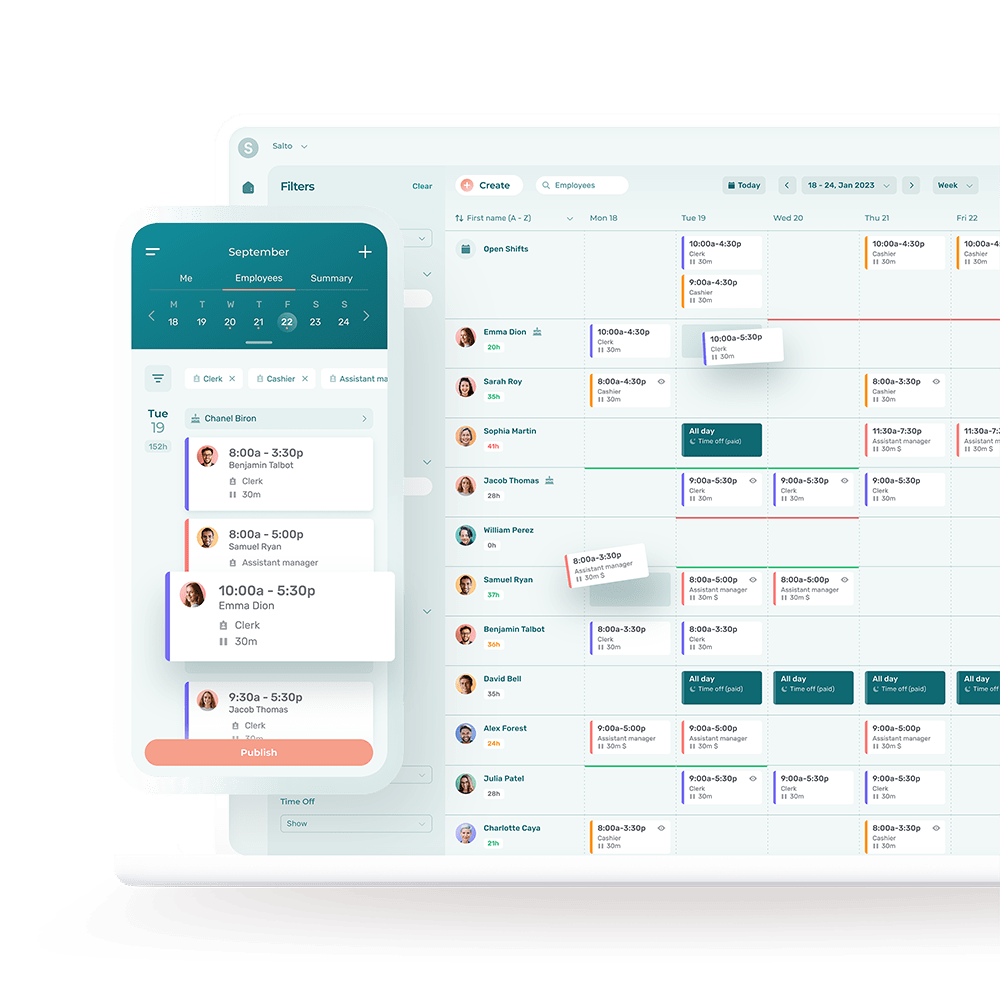Thinking of hiring an intern, but not quite sure what to do? You’ve come to the right place.
An intern is generally a student or young professional looking for their first work experience to validate their interest in a particular industry, or simply to gain experience.
Internships typically require a great deal of training and support from the employer. Most interns have little or no experience, so they’re looking for learning opportunities in a professional context.
In this article, you’ll learn:
- The pros and cons of hiring interns
- Tips and tricks to make your recruitment process easier
- Best practices on how to welcome interns to your team
Interns: A Qualified and Motivated Workforce
Some fields require students to take part in internships to gain work experience before officially starting their careers. These include fields such as healthcare, construction and even catering or hospitality.
In fact, whatever your field or industry, you can welcome an intern onto your team. For example, you could have an intern in your restaurant kitchen, in your pharmacy, organizing a festival or even recruiting a human resources student for a summer internship.
There are several advantages to having an intern on your team. For example, interns bring fresh ideas and a new perspective to your organization. They can therefore make interesting suggestions and help you see your working methods in a new light.
But the list of benefits doesn’t end there, hiring interns allows you to:
- Carry out a short-term project without the need for an external collaborator
- Access grants to cover part of their salary
- Simplify recruitment by offering a permanent position to a promising intern
- Fight against labor shortages, especially in specialized fields
- Develop your employees’ leadership skills
- Identify employees who could be good future managers
Generally speaking, taking on an intern is an enriching experience, both for the interns and for your employees.
On the other hand, having interns requires a great deal of coaching and supervision on your part. As a result, you may find that your productivity or that of your employees declines. Other disadvantages include the risk that interns will not have the employee experience they expect, an increase in workload, the need to meet certain legal obligations, and so on.
So make sure you’re ready and have the resources available before you embark on this adventure.
Any Company Can Hire an Intern, But…
Before you decide to hire an intern, it’s important to assess your needs and make sure you’ll be able to provide the right support.
Here are a few questions to ask yourself to help you think about it:
- What are some examples of tasks the candidate will be asked to perform?
- Who will manage or mentor your intern?
- How many hours per week can you offer?
- Are you in a position to offer remuneration?
- Are you willing to take the time to share your expertise?
- Do you need an intern or a new employee?
Make sure you hire interns for the right reasons, not just to benefit from cheap labor or to get them to do boring, unrewarding tasks.
Create a job description for your next intern. This will enable you to better assess your needs and will be relevant to your job offer.
Tips and Tricks to Help You Recruit an Intern
Hiring an intern is not exactly the same as hiring an employee. So you need to adapt your recruitment methods somewhat.
For example, start by writing an interesting job description to set yourself apart from other companies. If your interns are already required to have certain skills or qualifications, mention this. Otherwise, focus on the profile you’re looking for.
For example, describe the soft skills your candidates should possess: curiosity, time management, critical thinking, problem-solving skills, communication, etc.
Be careful: if you ask for perfect mastery of certain tools, you’re looking for an employee, not an intern. Remember, interns are in a learning situation. So it’s normal that they don’t master everything!
Post your job offer on specialized sites or affiliate with colleges and universities to recruit your next intern. And don’t hesitate to take part in job fairs if you have several internships to offer.
Dare to think outside the box: using social media for recruitment can also be an interesting idea to try.
Interns Are Not Free Labor
In Canada, remuneration for internships is not mandatory. But that doesn’t mean it isn’t essential or offered by many companies.
So, is it compulsory to pay interns? The short answer: no, not all the time, and only under certain conditions. On the other hand, offering proper remuneration to your interns contributes directly to your corporate image and has beneficial repercussions on their employee experience at your company.
If you need a helping hand to offer remuneration, there are plenty of grants you can turn to. The site of the Government of Canada, for instance, offers a few options.
Somewhat Different Interviews
Since interns are still in the early stages of their careers, they probably don’t have an endless list of experience and qualifications to present to you. That’s why the interview process needs to be approached a little differently.
Start by conducting phone interviews to shortlist candidates and streamline your recruitment process. These shorter, informal interviews will also enable you to go further than simply relying on students’ academic results.
During the formal interview, focus your questions on their academic experiences and give them the opportunity to tell you about their previous jobs, even if they’re not directly related to your field. Rather than focusing on specific skills, get to know their personality.
The most important thing during the interview is to validate the candidate’s expectations to make sure they match what you can offer. Otherwise, the internship experience, for both you and the student, may be disappointing. So, take the time to present the tasks you’d like them to perform to validate their interest.
And don’t hesitate to present your corporate culture and the types of learnings that you have to offer.
Here are a few questions to ask potential interns during the interview:
- What did you enjoy most about your last work experience?
- What is your greatest professional, personal or academic achievement/source of pride?
- If you have a question, but your internship supervisor is overwhelmed, what do you do?
- When you’re faced with a problem, what do you do to solve it?
If you’re hesitating between several candidates, you can also ask them for references so you can talk to former employers, teachers or sports coaches.
After Recruitment Comes the Onboarding
Although an intern is not considered an employee by law, you have everything to gain by treating them as such. So make sure you offer them a proper contract and integrate them into your team as you would a new recruit.
Above all, don’t neglect the onboarding of your interns. After all, it’s the first impression they will get of your organization.
So take the time to send them an overview of their first day on the job, and to validate a few administrative details if necessary, a few days before the start of their contract.
For example, you can add them to your workforce management software and record their information in their employee record.
From their first week on the job, discuss the training plan with them and designate a mentor to whom they can address any questions they may have.
Don’t hesitate to hold follow-up meetings with them throughout their internship. This will enable you to adjust their tasks and discuss any other issues.
Here are a few resources you can use to structure the induction and integration of your interns:
- Employee personal information form
- Pre-employment survey form
- Direct deposit registration form
- Integration plan for new employee
- Word template development plan
Your Next Intern May Become an Employee
When an intern completes their work experience with your team, be sure to have a final meeting with them to gather their impressions and end your collaboration on a positive note.
This is also an opportunity to review your processes based on your intern’s comments or suggestions.
And if the internship has gone beyond your expectations, why not offer your intern an official position?
In all cases, make every effort to ensure that your interns have a positive work experience. They’re sure to become positive ambassadors for your company.
Happy recruiting!












